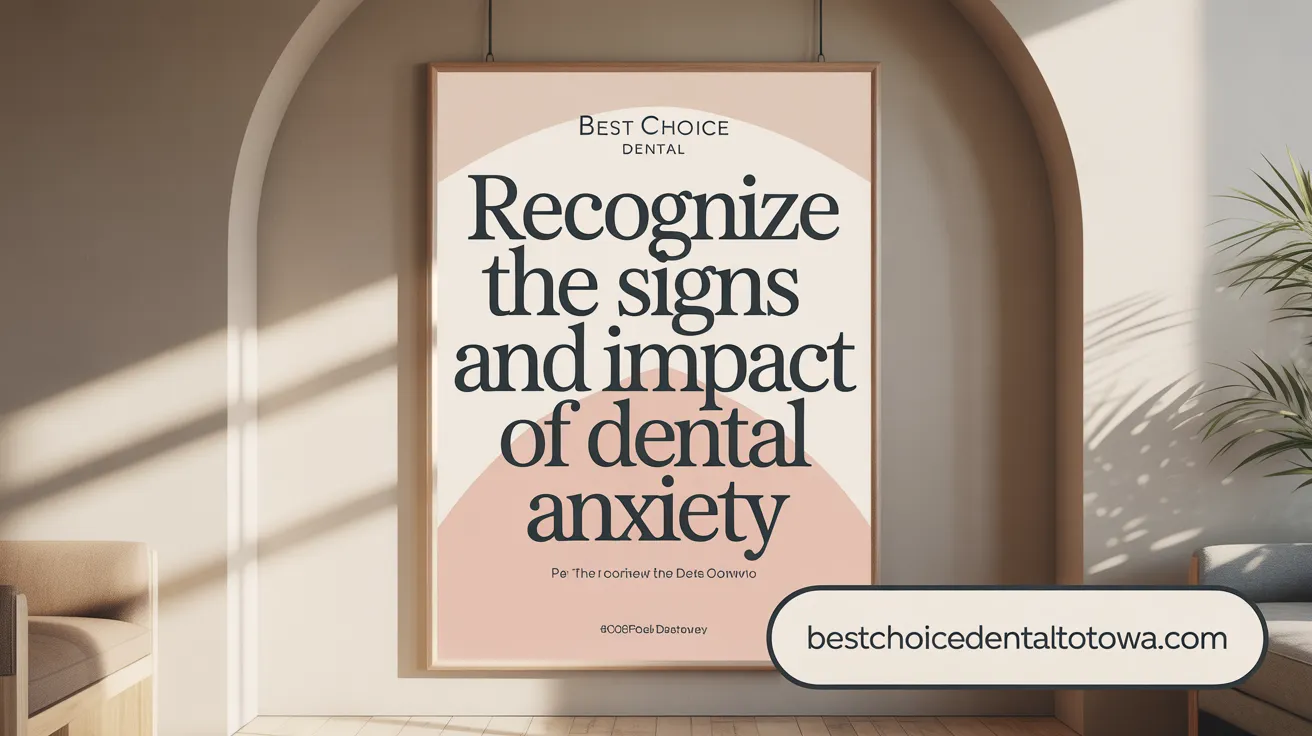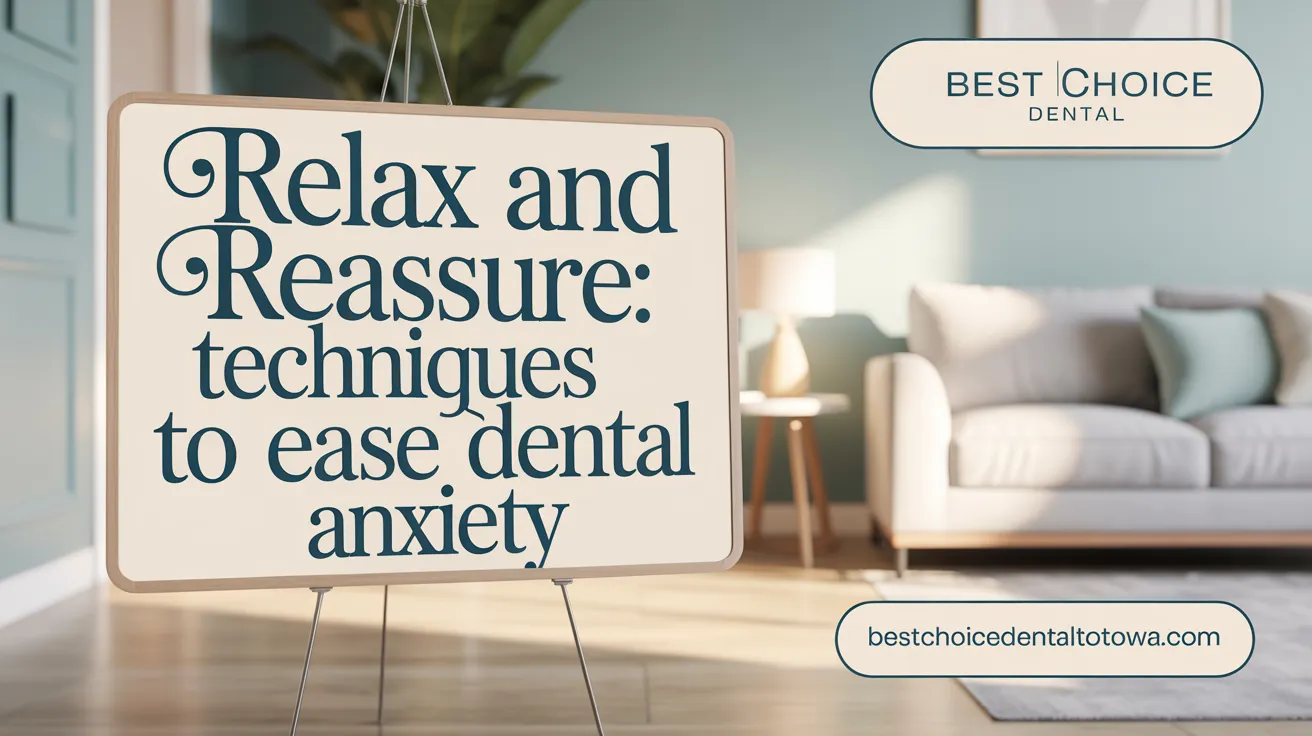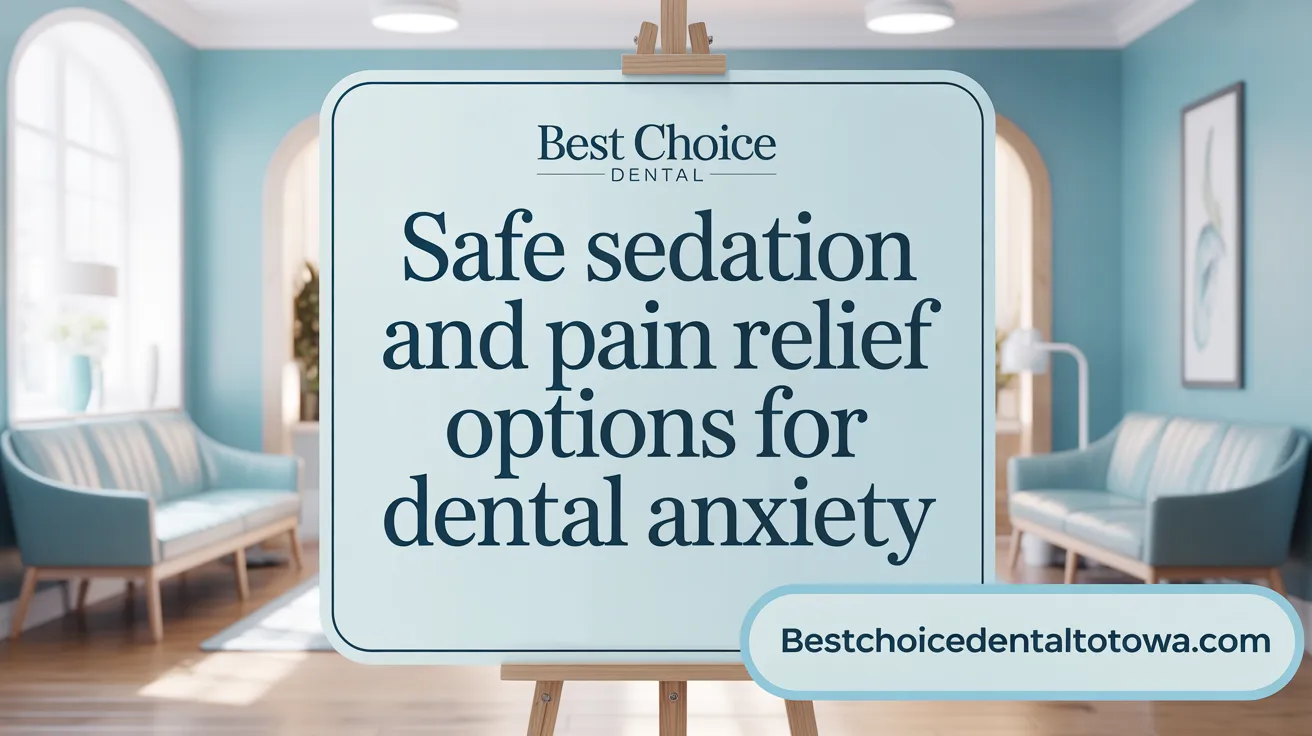Understanding and Overcoming Dental Anxiety
Dental anxiety affects a significant portion of the population and can prevent many from seeking necessary dental care. This anxiety ranges from mild unease to severe dentophobia, leading to avoidance of dental visits and subsequent oral health complications. Fortunately, with modern dental practices, understanding, communication, and practical techniques, patients can effectively manage and ease their dental fears before appointments. This article outlines evidence-based strategies and professional insights to help patients approach their dental visits with confidence and calm.
Recognizing Dental Anxiety and Its Impact

How Prevalent Are Dental Anxiety and Dentophobia?
Dental anxiety is a widespread issue, affecting between 50% and 80% of adults globally. Within this group, dentophobia—a severe, phobic fear of dental treatment—is less common, impacting approximately 3% to 9% of people. This range highlights the significant number of individuals who experience distress related to dental care, from mild to intense fear.
What Are Common Signs and Symptoms of Dental Anxiety?
People with dental anxiety may show physical and emotional reactions that include sweating, a racing heartbeat, distress, crying, or panic. Behavioral signs may consist of withdrawal or using humor and aggression to mask their fear. Some may experience fainting, chills, dizziness, nausea, trembling, or upset stomach when thinking about or attending dental appointments. For more details on signs of dental anxiety, you can refer to helpful resources.
What Are the Consequences of Avoiding Dental Care Due to Anxiety?
Avoidance of dental visits because of anxiety can seriously harm oral health. This includes increased risk of tooth decay, gum disease, and more complicated conditions such as mouth cancer. Delaying treatment often leads to the need for more complex, costly dental procedures and perpetuates a cycle of fear and further avoidance. Learn about effects of avoiding dental visits and the importance of regular check-ups.
What Causes and Triggers Dental Anxiety?
Dental anxiety can arise from several sources. Common causes include previous traumatic dental experiences and fears of pain or needles. Mental health conditions like post-traumatic stress disorder (PTSD) and generalized anxiety disorder may also increase vulnerability. Patients often fear loss of control, invasion of personal space, or feel embarrassment about their dental health. Additionally, sensory triggers such as the sounds and smells in dental offices can provoke anxiety. For more information on causes and triggers of dental anxiety, please see relevant discussions.
Communicating Openly with Your Dentist

How can sharing fears with the dentist alleviate dental anxiety?
Sharing your fears with your dentist is a crucial step in managing dental anxiety. When you communicate openly about your concerns, the dentist can tailor their approach to your specific needs. This may include offering clear explanations of procedures beforehand, allowing you to understand what to expect and reducing fear of the unknown. It also enables the dentist to accommodate requests such as more frequent breaks during treatment or the use of sedation options like nitrous oxide to help you relax. Overall, this openness fosters a more comfortable and less stressful dental experience.
What communication strategies help patients feel more in control during procedures?
Feeling in control during dental treatment can significantly reduce anxiety. Patients can establish agreed-upon signals or stop signs with their dentist before the procedure begins; these signals allow patients to pause treatment if they feel overwhelmed. Additionally, asking questions about the steps involved in a procedure provides clarity and reduces uncertainty. Voicing any discomfort or concerns during treatment helps the dental team adjust accordingly, making the patient feel safer and more involved throughout the process.
Why is building trust with the dental team important for anxiety management?
Building trust with the dental staff creates a supportive atmosphere where patients feel understood and respected. This trust reduces feelings of vulnerability, embarrassment, and fear often linked to dental visits. When patients believe that the dental team is compassionate and non-judgmental, their anxiety diminishes. Trust encourages open communication, making it easier to discuss fears and preferences, which in turn leads to more personalized and effective anxiety management.
Practical Techniques to Calm Nerves Before and During Appointments

What relaxation techniques can help ease dental anxiety?
Deep breathing exercises like the 4-7-8 or 3-4-5 methods engage the parasympathetic nervous system, which lowers heart rate and reduces stress. Progressive muscle relaxation, meditation, guided imagery, and mindfulness promote overall calmness, helping patients to manage their anxiety effectively before and during dental visits. For more on relaxation exercises for dental anxiety, see this resource.
How can distraction help during dental procedures?
Distraction methods are helpful in diverting attention from anxiety triggers. Patients can listen to calming music, podcasts, or audiobooks, and some find watching videos comforting. Using stress-relief tools such as stress balls also helps occupy the hands and mind, decreasing nervous energy and making the experience less stressful. Learn more about distraction techniques during dental visits.
What scheduling tips can reduce anxiety for dental appointments?
Scheduling dental visits during early morning hours or on less busy days can help minimize waiting times and avoid overcrowded clinics. These quieter appointments allow patients to feel more relaxed and in control, reducing anticipatory anxiety about the visit. Read about scheduling appointments on less busy days and early morning dental appointments.
Why should patients avoid high-sugar and caffeinated foods before dental visits?
Consuming high-sugar or caffeine-rich foods can lead to increased jitteriness and heightened anxiety symptoms. To maintain a calmer state before appointments, it is advised that patients avoid these stimulants and instead choose calming alternatives like caffeine-free tea. More details are available on avoiding high-sugar and caffeine foods before dental visits.
Adopting these practical techniques—relaxation exercises, effective distractions, mindful scheduling, and careful diet choices—can make dental appointments significantly less stressful for anxious patients.
Professional Anxiety Management: Sedation and Pain Control

What sedation options are available for dental anxiety?
Dental sedation offers several methods tailored to anxiety levels and patient needs. Common options include nitrous oxide sedation, known as "laughing gas," which provides mild, quick-relief sedation. Oral anxiolytics are pills taken before the appointment for calming effects. Intravenous (IV) sedation, or "twilight sedation," relaxes patients deeply while keeping them awake but often with little memory of the procedure. For the most severe anxiety or extensive dental work, general anesthesia —administered in hospital settings—puts the patient fully to sleep. See also Sedation dentistry for anxiety for additional options.
How does sedation help anxious dental patients?
Sedation works by reducing the patient's anxiety and awareness of the dental procedure. It relieves pain and discomfort and diminishes the stress response. Patients often report feeling calm and may have limited or no memory of the visit, making dental care less daunting and improving their willingness to maintain regular appointments. For more details on managing dental anxiety, see resources on sedation options.
What pain control methods lessen anxiety related to dental procedures?
Pain control is crucial in easing dental anxiety. Topical anesthesia in dental care and local anesthesia options such as numbing gels prepare the site for injections, which are usually delivered using advanced, less painful techniques like computer-controlled local anesthetic delivery or electronic dental anesthesia. These reduce pain and discomfort during injections. After procedures, pain management strategies like cold therapy (ice packs), rinses, and over-the-counter pain relievers support recovery and reduce fear of pain.
When is pharmacological intervention necessary for dental anxiety?
Medication use is recommended for severe anxiety or clinical dental phobia when psychological and behavioral methods alone are insufficient. Anti-anxiety medications for dental procedures like diazepam can be prescribed. Conscious sedation in dentistry methods, including nitrous oxide and IV sedation, help manage moderate to high anxiety. General anesthesia is reserved for the most extreme cases or complex dental treatments requiring deep sedation and complete unconsciousness.
Advances in anesthesia and patient comfort have transformed dental care. Modern numbing techniques minimize pain, while sedation options for dental anxiety provide a spectrum of anxiety relief, ensuring most patients receive compassionate, stress-free treatment tailored to their needs.
Building a Positive Dental Routine and Support System

How do regular dental visits help ease anxiety?
Regular dental visits play a vital role in calming dental anxiety. By attending appointments consistently, patients become familiar with the dental environment and procedures, which reduces the fear of the unknown in dentistry. Frequent visits also help prevent the development of complex dental problems, which are often associated with painful or long treatments, ultimately breaking the cycle of avoidance and worsening anxiety as explained in the importance of regular dental visits.
What role do friends or family play during dental visits?
Bringing a trusted companion such as a friend or family member to dental appointments provides emotional support and reassurance. Their presence can distract the patient from anxiety-provoking stimuli and reduce feelings of isolation or fear. This companionship often helps patients feel safer and more confident during dental procedures, supporting concepts like bringing support to dental appointments and supportive dental visits with a friend.
How can dental offices create a more relaxing environment for anxious patients?
Dental offices can foster a calming atmosphere by incorporating amenities like soothing music, soft ambient lighting, pleasant aromas through aromatherapy, and comfort items such as eye masks and blankets such as mentioned in creating a calm dental environment and aromatherapy in dental clinics. Additionally, providing clear explanations about the treatments beforehand helps demystify the process, easing patient fears and promoting a sense of control as detailed in asking questions during dental visits and communicating with your dentist.
Why is a consistent dental care team important for anxious patients?
Consistency in the dental care team builds trust and establishes positive relationships over time. When patients see familiar dentists and staff who understand their anxiety and personal needs, it creates a comfortable and supportive environment. This trust reduces anxiety, increases cooperation during visits, and encourages regular attendance, contributing to better oral health and decreased fear. These factors are supported by research on building trust with your dentist and positive reinforcement in dentistry.
Maintaining regular dental appointments, supported by a welcoming environment and trusted companions, forms a strong foundation to manage dental anxiety effectively.
Additional Strategies and Emerging Therapies
What psychological therapies help manage dental anxiety?
Effective psychological treatments for dental anxiety include cognitive-behavioral therapy (CBT), exposure therapy, guided imagery, hypnosis, and relaxation training. These techniques help patients reframe fearful thoughts, gradually face dental-related situations, and reduce emotional distress. Behavioral strategies, like muscle relaxation and deep breathing, complement these approaches to soothe anxiety.
Are there natural or lifestyle methods to reduce anxiety before dental visits?
Yes. Eating nutrient-rich foods such as leafy greens, berries, and salmon provides magnesium and omega-3 fatty acids that support relaxation. Herbal teas like chamomile and peppermint calm nerves, while supplements including magnesium and ashwagandha promote stress relief. Aromatherapy using lavender oil, staying hydrated, and ensuring adequate sleep before appointments also help manage anxiety naturally (foods and supplements for dental anxiety).
How can technology assist in easing dental anxiety?
Modern technology offers several tools to alleviate dental fears. Virtual reality and relaxation apps immerse patients in calming environments to distract from dental procedures. Cognitive-behavioral therapy self-help apps guide users in anxiety management techniques. Additionally, using music , audiobooks, or videos during treatment provides effective distractions to minimize stress.
When should someone with dental anxiety seek professional mental health support?
Individuals experiencing severe or persistent dental phobia—characterized by irrational fear that disrupts daily life or causes avoidance of dental care—should consult with mental health professionals. Psychologists or specialists trained in anxiety disorders can provide tailored therapies such as CBT, exposure therapy, or hypnosis, ensuring more effective management and improved oral health outcomes (mental health support for dental phobia).
Embracing a Calmer Dental Experience
Dental anxiety is a common and manageable condition that should not prevent individuals from receiving essential oral healthcare. By understanding the nature of dental fears, fostering open communication with dental professionals, utilizing relaxation and distraction techniques, exploring sedation options when necessary, building positive routines, and considering psychological support for severe cases, patients can significantly reduce anxiety and approach dental visits with greater confidence. Modern dentistry offers compassionate care tailored to individual needs, ensuring that a healthy smile is within reach for everyone.
